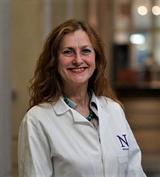
August 2023 Newsletter

August 2023 Newsletter

Sponsored Research
PI: Caroline Le Poole, PhD professor of Dermatology and Microbiology-Immunology
Lymphangioleiomyomatosis (LAM) is a rare disorder with devastating consequences for the young women diagnosed with this disease. We observed occult expression of the glycoprotein gp100 and other melanoma associated antigens in nodular, pulmonary tumor lesions. LAM cells carry a dysfunctional TSC complex and exhibit constitutive mTOR activation. Though rapamycin can provide relief, there is a great need to develop a true cure for women with LAM. We evaluated the expression of suitable antigens and the associated infiltration by immune cells. Here we propose to capitalize on the occult expression of melanoma associated antigens to develop safe and effective, T cell-based immunotherapy for LAM.
First, we will generate constructs targeting LAM antigens to transduce T cells and prepare the cells for adoptive transfer. These constructs are equipped or not with a homing receptor to drive the adoptively transferred T cells to LAM lung, exploiting the consistent overexpression of the chemokine ligand CCL2 within affected tissues, in order to minimize off tumor effects. Transgenic T cells are generated with stem cell-like attributes to promote longevity and continued functionality. Efficacy and safety comparisons are made between TCR transgenic and HLA-independent CAR T cells targeting a LAM surface antigen. Based on expression of a natural receptor epitope encoded by the construct, resulting T cells are readily sorted and traced, and will be put to the test in mouse models of the disease. We will engage an immunocompetent disease model, as well as PDX implanted mice to explore the treatment potential of adoptively transferred, LAM reactive T cells. Within PDX mice, the LAM microenvironment is well conserved. Expression of LAM tumor antigens can be maintained over time, while therapeutics can be tested in a statistically and biologically meaningful way. Finally, we will explore the immune microenvironment in LAM and in PDX tissues exposed to adoptive transfer or not, to learn whether T cells harbored by LAM lung or supplied by adoptive transfer can be taught to clear existing lesions. Next, our collaborative group aims to develop a winning immunotherapeutic approach to treat the devastating disease.
The project will thus cover (1) generating and in vitro testing of transgenic mouse and human T cells; and (2) measuring the anti-tumor efficacy of adoptively transferred T cells in immune competent as well as PDX models of LAM as well as (1) in-depth analysis of the immune environment encountered in LAM lesions before and after adoptive transfer. Resulting preclinical data can then serve to design a clinical trial in follow-up studies and test the hypothesis, that benign tumors in LAM are amenable to treatment by adoptive transfer of tissue homing, LAM reactive T cells.
(Michael Nishimura, PhD, from Loyola University is a co-PI for this award.)